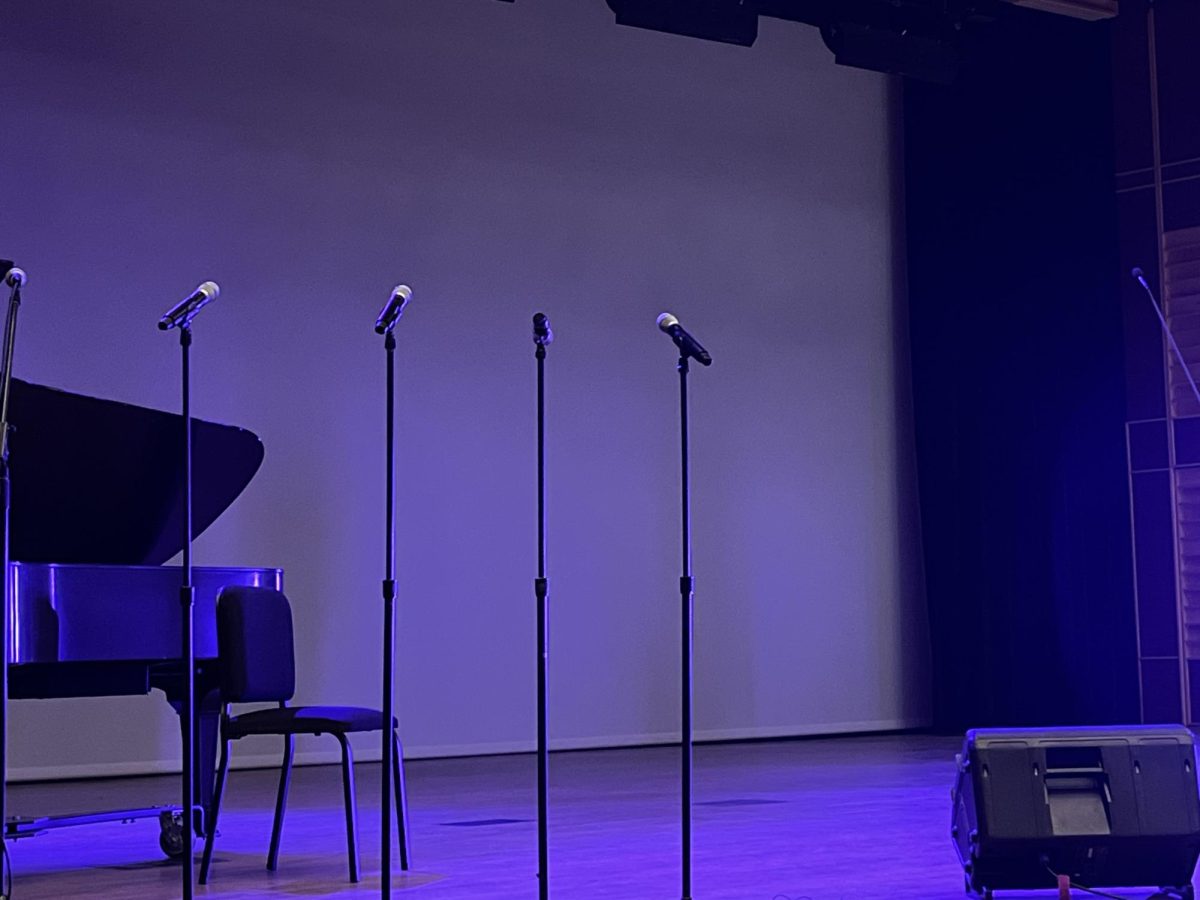“A universal desire to know and be known.”
It’s a phrase that came up several times in Chimes’ interview with Calvin staff member and 2003 graduate David Ellens as he spoke about his new play, “Look Me in the Eyes: Stories of Intimacy and Sexuality,” which premiers on March 1.
You might be familiar with Ellens’ work. Last year, he wrote and produced the thoughtful and provoking play “The Other Half: Stories of Gender, Sex, and Sexuality.” “Look Me in the Eyes” is a production very much in the same vein, one that centers on the unique voices of several Calvin community members.
Ellens’ plays are what is known as verbatim theatre. “It feels like a documentary film, but it’s onstage with actors,” he explains. Creators of verbatim theatre generally choose a topic, do dozens of interviews with diverse individuals or groups on the subject, transcribe the conversations and then use those words to create a coherent script, which is performed by actors. “The heart is editing and shaping the transcript,” says Ellens, who finds the transcribing process to be meaningful and challenging.
Ellens’ love for the form began when he attended Calvin.
“It all goes back to a class I took at Calvin — performance studies,” he says.
The final project for the class was to choose someone to interview, transcribe the conversation, cut it down and then play that person.
“It was a game changer for me, to invest in someone else so deliberately,” he remembers. “Trying to accurately play them was like embodying empathy. It was literal empathy. It was treating them with awareness and respect.”
Verbatim theatre is gaining popularity world-round as an excellent media for portraying the stories of others. Its ability to bring together many stories of the same theme makes it particularly poignant in a world where surface-level interactions are the norm. “This kind of investing in each others’ stories is not something we really do,” says Ellens.
That passion and high level of investment is necessary to tackle Ellens’ latest subject: intimacy. “Look Me in the Eyes” engages several issues surrounding intimacy and sexuality in the Calvin community.
His phrase “the universal desire to know and be known” comes up when Ellens discusses the themes of his play.
“It’s largely talking about eros, our entirety, including our sexuality. It can be somewhat boiled down to ‘how do we take ownership of our sexuality and how does our sexuality fit into the holistic principle of intimacy?’ he says. “The theme is largely rooted in this universal desire to know and be known.”
Specifically, the play deals with several issues within the topic of intimacy and sex. Ellens describes the first act as “very aggressive about sex,” while the second act is about “where does that fit in intimacy?” Act one addresses such things as boundaries (how to create and honor them), purity (how we define it) and accountability (creating it for ourselves and others). Act two is largely about sexual practice and its meaning. It focuses on how we as Calvin community members take ownership of our sexuality.
The focus on community members was of great importance to Ellens. “I’ve kept it entirely in the Calvin community,” he says. “I didn’t want to the audience to have the ability to make it about the other. I wanted to keep the immediacy — our voices as the Calvin community.”
Ellens was inspired to create the play by a belief that sexuality and intimacy are taboo topics that don’t get a lot of airtime in our conversations. “I wanted to investigate my own intimacy and sexuality, which I feel have been warped or damaged over the years,” he says.
“I wanted to ask other people ‘How do you feel about intimacy, how do you set boundaries or think about purity?’ But I didn’t have that avenue in regular conversation. Lots of people don’t.”
Despite this wariness many people feel when talking about sex and intimacy, Ellens discovered that people, even strangers who volunteered to be interviewed, were very open about the subject. “When the interviews were done, it felt like both of us had just been through exhaustive therapy,” he remembers.
“Many of them said ‘I’m willing to do this on the off chance that it might be able to help somebody.’ That’s a beautiful thing I wasn’t expecting.”
One thing Ellens wanted to shy away from when creating the script was giving the play a rulebook sort of feel.
“Mary Hulst helped with the selection of voices. She asked me ‘Is this one a window into something valuable, or is it a tool to help this community be better at intimacy?’ I wanted to create a script that is both of those things, but without being directive about it too.
Audiences can expect a lot of honest and candid testimonies throughout the play. Ellens has worked hard to create a sense of vulnerability in the interviews, as well as among the cast members presenting the voices.
“Vulnerability doesn’t mean you have to spill your guts,” he reassures. “It’s about baby steps around the awkwardness and hilarity and pain of it all.”
He encourages community members of all persuasions to attend. “Don’t feel like you won’t be welcome,” he says, while highlighting the diversity of backgrounds represented in the show. “There’s a married couple, the 24-and-never-been-kissed type, a gay voice and a number of other voices.”
“[Everyone should attend] because they’re a part of the community,” says Ellens.
“These are our voices. I think, I hope, that anybody who walks in will be able to connect and put their story into context. They’ll take baby steps in the direction of being a sexual being who wants to know and be known.
“Come to help further the conversation and add your piece to the puzzle, even it that means being silent. I hope people walk away talking about it, even if they disagree. It’s about dialogue and introspection.”
Ellens hopes that “Look Me in the Eyes” will provide a platform for inquiry and discovery. At an age when many students are delving into the world of intimacy and sexuality, hearing the stories of others can be a big help. Ellens concludes,
“This is a piece that’s a springboard for an incredibly, unusually honest discussion about how we all take ownership of our sexuality.”
“Look Me in the Eyes: Stories of Intimacy and Sexuality” is playing in the Gezon Theater March 1 and 2 and 7-9. All shows are at 7:30 p.m., and all are free and unticketed. Each show will be followed by a talkback with Ellens and campus ministries.






